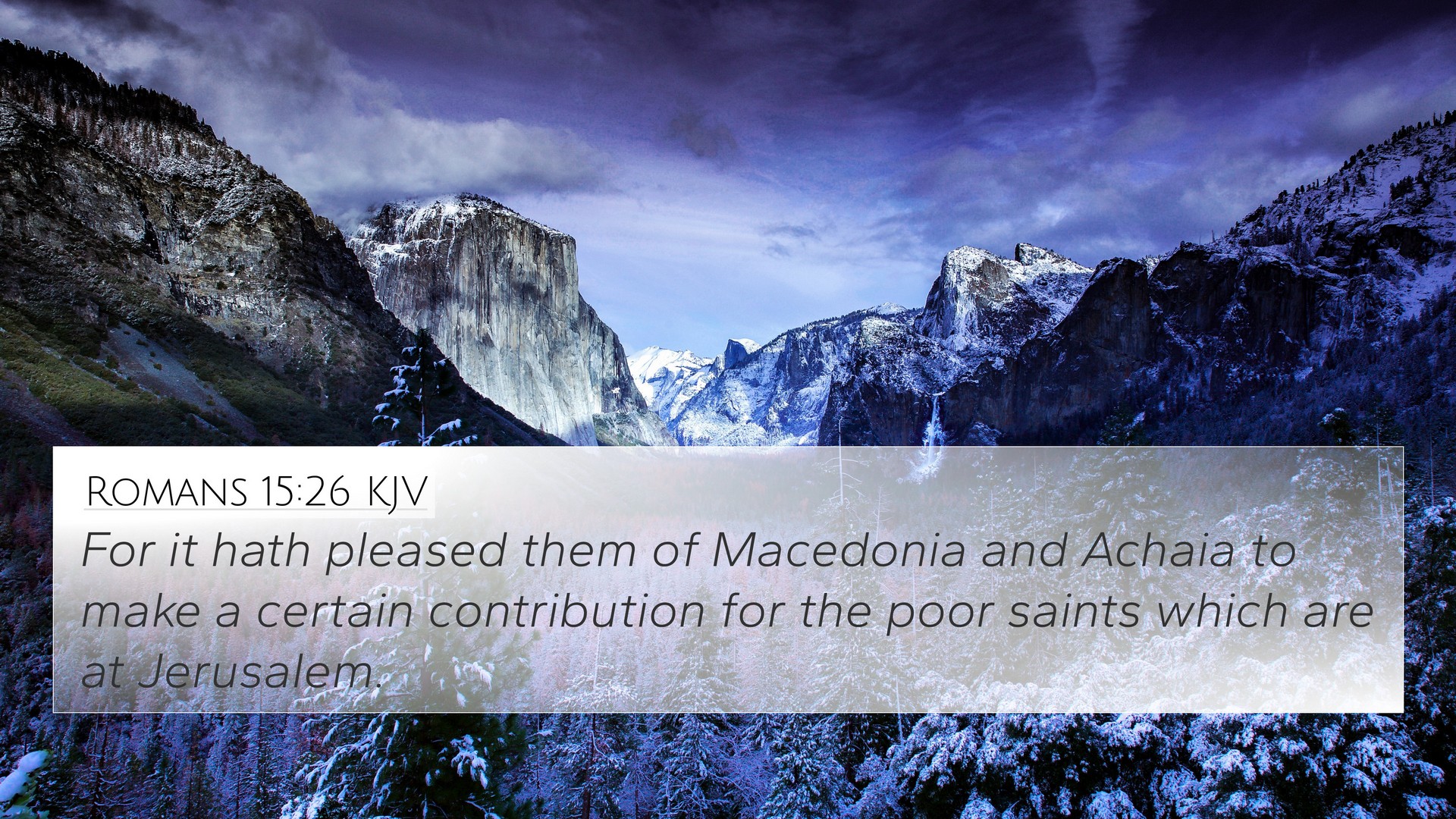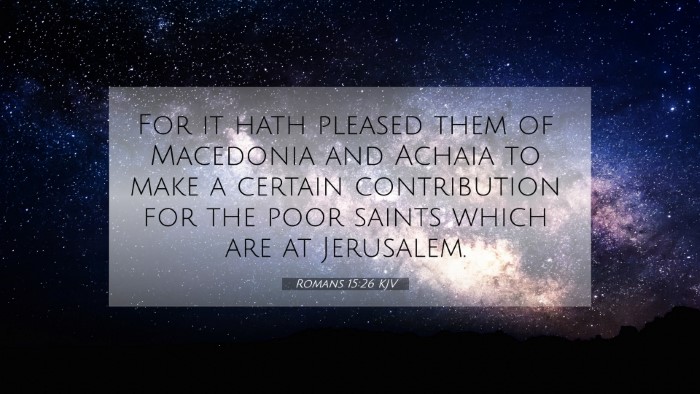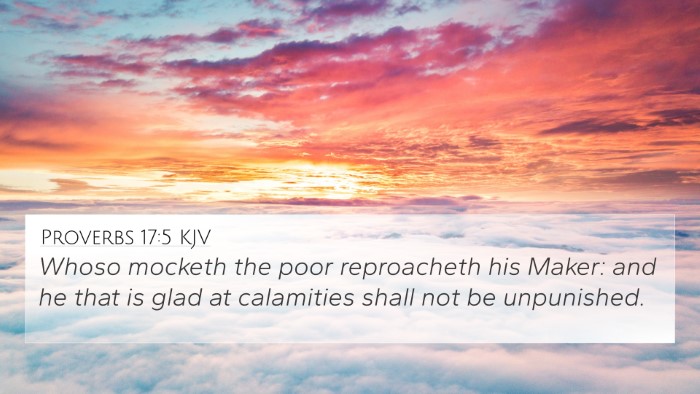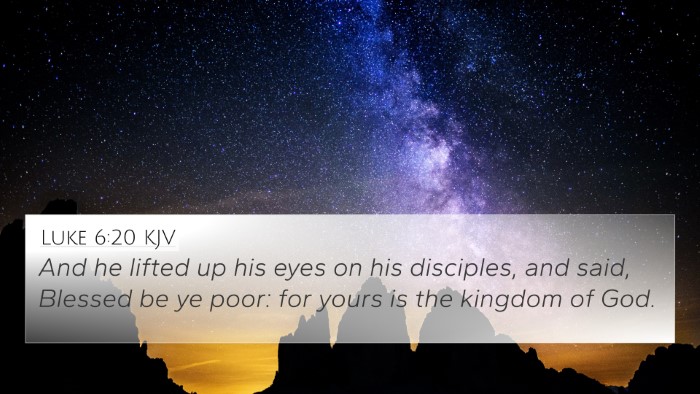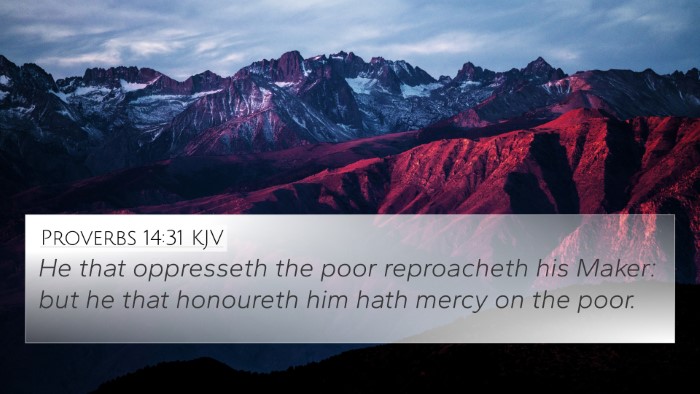Understanding Romans 15:26
Scripture: Romans 15:26 - "For it hath pleased them of Macedonia and Achaia to make a certain contribution for the poor saints which are at Jerusalem."
Summary of Romans 15:26
This verse highlights the generosity of the churches in Macedonia and Achaia, who decided to contribute to the needs of the impoverished saints in Jerusalem. Paul emphasizes this act of charity within the context of his broader message on unity and support among believers, illustrating the interconnectedness of Christian communities.
Commentary Insights
-
Matthew Henry: Henry emphasizes the importance of the churches' contributions as a demonstration of Christian love and solidarity. He notes that this financial aid reflects not only the physical needs but also the spiritual unity that exists across different congregations of believers.
-
Albert Barnes: Barnes comments on the background of the contribution, highlighting the situation of the Jerusalem saints who were experiencing poverty and persecution. He connects this act of charity to the principle of mutual assistance in the body of Christ and the early Church's conviction to care for one another.
-
Adam Clarke: Clarke provides additional context regarding the geographical locations and their significance, noting that both Macedonia and Achaia were important regions for the spread of the Gospel. His interpretation points to the unity among believers despite geographical distances and cultural differences.
Thematic Connections
The themes of generosity, unity, and communal support run consistently through the New Testament. In Romans 15:26, we see a vivid reflection of these themes that resonate within various scriptures.
Bible Cross-References
Here are several Bible verses that relate to Romans 15:26, demonstrating connections within Scripture:
- 2 Corinthians 8:1-4: Discusses the generous giving of the Macedonian churches, reinforcing the theme of selfless contributions.
- Galatians 6:10: Encourages believers to do good unto all, especially to fellow believers, reiterating the importance of supporting one another.
- Acts 11:27-30: Describes how the early Church responded to the need in Judea through contributions, indicating a pattern of collective aid.
- Philippians 4:15: Paul discusses the support he received from the Philippian church, affirming the principle of mutual support.
- 1 John 3:17: Explores the moral obligation of Christians to act when a brother is in need, aligning with the call for assistance to the Jerusalem saints.
- Matthew 25:35-40: Jesus speaks about serving the least of these, highlighting the Christian duty to help those in need.
- James 2:15-16: Challenges believers to not just speak of faith but act on it by providing for the needs of others.
Cross-Referencing Techniques
For effective study, explore these tools and methods that aid in Biblical cross-referencing:
- Utilize a Bible concordance to locate keywords and topics.
- Implement a Bible cross-reference guide for quick access to related verses.
- Practice cross-reference Bible study by noting connections during readings.
- Engage in detailed studies by identifying connections between Old and New Testament teachings.
- Use Bible reference resources and commentaries to expand on themes and interpretations.
Conclusion
Romans 15:26 serves as a powerful reminder of the communal responsibility present within the body of Christ. The interconnectedness of believers is evidenced through their willingness to support those in need, reflecting God's love and generosity.
Further Study Suggestions
Those seeking to deepen their understanding may consider:
- Examining how other Pauline epistles address charitable giving and communal support.
- Exploring links between prophetic teachings in the Old Testament and the support dynamics in the New Testament.
- Investigating how themes of offering and generosity are treated in different Gospels.
